The Defense Advanced Research Projects Agency this month announced that the World Wide Web Consortium (W3C) approved a computer language based on DARPA Agent Markup Language (DAML) as an international standard
Published:
19 February 2004 y., Thursday
Web Ontology Language, known as OWL, was designated an official Web standard, joining such better-known languages as HTML and Extensible Markup Language (XML). The DARPA markup language project last year evolved into OWL and is continuing development under W3C's watch.
OWL builds on XML and is designed to allow a higher level of interoperability among devices, Web sites and databases. It uses XML as to transport data, but OWL is designed to link disparate data from different sources and determine relationships between them.
The language is designed to be one avenue by which designers can pursue the semantic Web, the next-generation "intelligent" Internet.
OWL's proponents say it can refine searches and Web services, giving users more accurate and precise information based on queries. And the language could potentially let computers recognize how disparate forms of information are linked and draw conclusions based on those links.
For example, a computer might check meteorology reports to determine if a traveler is going to fly into bad weather, then automatically check for other flights and flights to nearby areas, and alert the traveler to those options.
Šaltinis:
fcw.com
Copying, publishing, announcing any information from the News.lt portal without written permission of News.lt editorial office is prohibited.
The most popular articles
Software company announced new structure_ of it_s business.
more »
 Wincor Nixdorf AG has opened a global distribution center in Singapore to support its growing operations in Asia Pacific.
more »
Wincor Nixdorf AG has opened a global distribution center in Singapore to support its growing operations in Asia Pacific.
more »
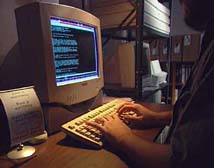 Over 3 million people in Europe bet online on sports like football, cricket and horse racing.
more »
Over 3 million people in Europe bet online on sports like football, cricket and horse racing.
more »
 Executives from Wincor Nixdorf Inc. (USA) hosted a bankers' forum last month, highlighting emerging trends in a challenging U.S. economic environment.
more »
Executives from Wincor Nixdorf Inc. (USA) hosted a bankers' forum last month, highlighting emerging trends in a challenging U.S. economic environment.
more »
 The appeal for a reverse ATM code has again popped up in mainstream press, this time in Illinois, where the (Peoria, Ill.) Journal Star last week reported about a technology that has been discussed in the industry for several years, yet fails to take off.
more »
The appeal for a reverse ATM code has again popped up in mainstream press, this time in Illinois, where the (Peoria, Ill.) Journal Star last week reported about a technology that has been discussed in the industry for several years, yet fails to take off.
more »
 At the CeBIT fair grounds in Hanover, Germany, you move into a different realm. One with robots - lots of bots.
more »
At the CeBIT fair grounds in Hanover, Germany, you move into a different realm. One with robots - lots of bots.
more »
 During the 10th annual ATM Industry Association conference last month, ATMIA and ATM Marketplace recognized four leading ATM players for their individual or combined contributions to the ATM Industry.
more »
During the 10th annual ATM Industry Association conference last month, ATMIA and ATM Marketplace recognized four leading ATM players for their individual or combined contributions to the ATM Industry.
more »
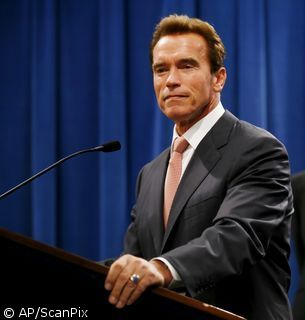 The show held annually in the northern German city of Hannover usually invites a foreign nation to become an official partner, but in a historic move that distinction was granted to the State of California this year.
more »
The show held annually in the northern German city of Hannover usually invites a foreign nation to become an official partner, but in a historic move that distinction was granted to the State of California this year.
more »
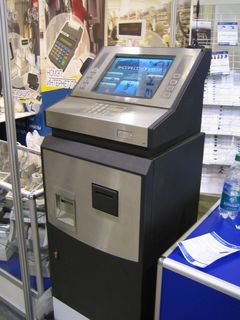 After a six-month research project that involved the surveying of some 1,600 ATM and financial executives from throughout the world, ATM Marketplace and the ATM Industry Association have announced plans to release the findings of their research next month.
more »
After a six-month research project that involved the surveying of some 1,600 ATM and financial executives from throughout the world, ATM Marketplace and the ATM Industry Association have announced plans to release the findings of their research next month.
more »
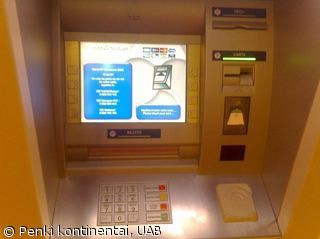 Technology Credit Union has teamed with LocatorSearch to introduce a global positioning system (GPS) download to help members find surcharge-free ATMs.
more »
Technology Credit Union has teamed with LocatorSearch to introduce a global positioning system (GPS) download to help members find surcharge-free ATMs.
more »
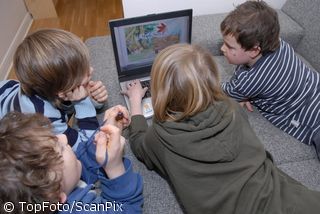 It's easy to demonise violent video games, but a report making its way through parliament says that "video games can have beneficial effects upon young people."
more »
It's easy to demonise violent video games, but a report making its way through parliament says that "video games can have beneficial effects upon young people."
more »